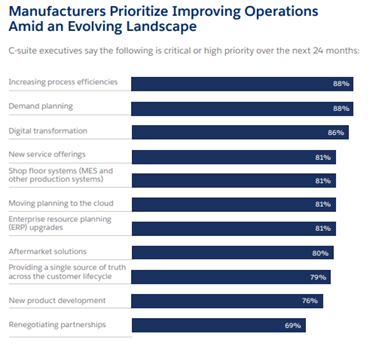In Salesforce’s survey of 750 manufacturers, “Trends in Manufacturing”, 95% of the manufacturers expect some change in terms of a need, or an opportunity, to rethink their business operations after the Covid-19 pandemic. The wave of digital transformation was started with Industry 4.0 revolution and has gone exponential after the Covid-19 Pandemic. Let’s look at what manufacturers are prioritizing to improve their operations in the following figure from the survey:

Image Source = Google | Image By – Salesforce
Why manufacturing industry need CRM?
Nowadays, digital disruption is at the doorstep in the manufacturing industry. It has become vital for enterprises to adapt this either in order to survive in the market or gain a competitive advantage. By embracing various software solutions, manufacturing industries have matured and become more customer-centric as they face challenges in a competitive market to stay ahead. Companies are trying to capitalize on recent trends for customer acquisition and retention. Traditionally operated manufacturing industries running on ERP systems, now focusing more on CRM solutions that combine ERP and other automation to facilitate them better. It has allowed enterprises to adopt lean manufacturing and automation strategies to satisfy future demand. To understand this, let’s look at the pain points in the manufacturing industry which can be resolved with CRM:
- Legacy tools and Siloed operations
- Lower rate of customer engagement
- Lack of supply chain visibility
- Lack of an integrated system
- Poor sales forecast
- Partner management
How CRM helps to resolve manufacturing pain points:
1. Better Sales Performance & lead conversion
A good CRM like Salesforce helps the manufacturing industry discover quality leads so that their time isn’t wasted on ineffective ones. With the Sales Cloud, all the sales conversations can be stored in one place, enabling the sales team to manage all accounts, leads, opportunities, and communications within one system, and no more missed deals or opportunities. The sales team can utilize the marketing cloud / Salesforce Pardot to automate marketing activities and generate upsell/ cross-sell opportunities with analytics. A sales team can become more organized with all the integration available, and the sales team can improve the order pipeline with more closed deals. Also, CPQ (configure-price-quote) feature can help in creating customized product catalogue, quotation management.
2. Enhanced Customer Satisfaction
One of the most important aspects of successful sales is the customer experience. CRM is the key for improving customer experience. It gathers data on customers, leads, and prospects, and provide a 360-degree overview of their buying behaviour and preferences. Also, CRM can give access to the direct system of customers feedback which is more effective in improving products and services. With the Service Cloud, Salesforce allows a company to create a system to track, manage and resolve customer queries in one place. This ensures faster response to queries to reduce customer wait time. By utilizing this, Company can nurture customer relationships well and can improve customer satisfaction substantially. More information about the customer can help communicate more frequently and efficiently, resulting in a better relationship.
3. Better Forecasting
By completely tracking customer orders, Salesforce CRM can produce a reliable sales forecast. With the Einstein analytics capability, companies can determine each customer’s buying behavior, identify peak order periods, long-term patterns, and generate accurate sales estimates for future planning. Better production planning aided with this information helps companies deliver orders at the right time, in the right quantity, and at the right place. It is critical for staying ahead of the competition.
4. End to end Supply Chain visibility
Using a CRM can provide detailed and actionable information into operations, inventory management, order processing, warehousing, distribution networks, and more in the manufacturing industry. This aids in better production planning and control. For more effective operations, company can create workflows and automate procedures. An efficient supply chain allows companies to have resources and rapidly transport material from the shop floor to the market.
5. Integration of CRM with ERP
ERP is the backbone of any manufacturing industry. So, it is an essential tool for managing the sales process, but it will be ineffective for manufacturers unless it is fully integrated with your ERP. A connected system can save time by streamlining the information across all departments. Salesforce offers integration with ERP, which helps to improve the efficiency of essential operations and provides improved visibility of the process. Synergizing ERP and CRM will help improve the efficiency and effectiveness of the manufacturing industry. To read more about ERP integration with CRM can refer: https://www.mirketa.com/erp-vs-crm-everything-you-need-to-know/

Image Source = Google | Image By – Salesforce
Choosing Salesforce CRM is, without a doubt, a win-win scenario for the manufacturing industry. Companies can experience how Salesforce can help them improve manufacturing processes. Salesforce has a well-rounded set of features for businesses of all sizes. Salesforce for manufacturing aid manufacturers in engaging with consumers, managing and boosting sales, resolving customer service concerns, and seamlessly cooperating across several departments to provide exceptional customer care and increase productivity. These benefits are provided by Salesforce’s various cloud platforms, which are interconnected and give excellent options to improve the business’s overall ROI.
To learn more about the features of Manufacturing cloud and implementation, please visit: https://www.mirketa.com/everything-you-need-to-know-about-manufacturing-cloud/

Image Source = Google | Image By – Salesforce
Its very Informative